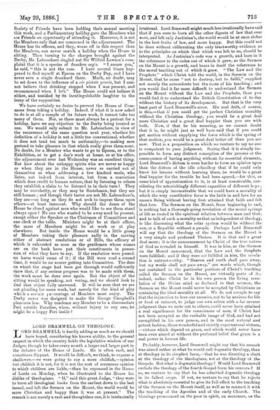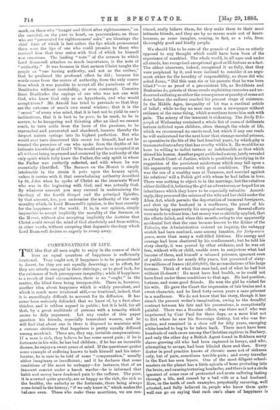LORD BRAMWELL ON THEOLOGY.
LORD BRAM WELL is hardly adding as much as we should have hoped, considering his known ability, to the general respect in which the country holds the legislative wisdom of our Judges, though he takes every month a larger and larger part in the debates of the House of Lords. He is often rash, and sometimes flippant. It would be difficult, we think, to express a shallower,—we were going to say a more childish,—opinion but childish it is not, for it is not the sort of erroneous opinion to which children are liable,—than he expressed in the House of Lords on Monday, when he illustrated to the House his dislike of theologians. "If," said this great Judge, 'they were to burn all theological books from the earliest down to the last issued, and left the Sermon on the Mount, the world would be more Christian and happy than it was at present." The remark is not merely a rash and thoughtless one, it is intrinsically
irrational. Lord Bramwell might much less irrationally have said that if you were to burn all the other digests of law that ever were, and left only Justinian's, the world would be at once richer in the best fruits of law, and more happy. But this could not be done without obliterating the only trustworthy evidence as to the principles on which that which was left to us, should be interpreted. As Jnstinian's code was a growth, and bore in it the references to the codes out of which it grew, so the Sermon on the Mount is a growth, and bears in itself the references to the moral teaching out of which it grew. 'The Law and the Prophets" which Christ told the world, in tho Sermon on the Mount, that he came "not to destroy, but to fulfil," supplied not merely the antecedents but the roots of his teaching ; and you would find it far more difficult to understand the Sermon on the Mount without the Law and the Prophets, than you would find it to understand the British Constitution of to-day without the history of its development. But that is the very least part of Lord Bramwelrs error. His real drift, of course, is this,—that if you could get the perfect Christian morality without the Christian theology, you would be a great deal more Christian and a great deal happier than you are with both. Now, if that be his meaning, as we cannot doubt that it is, he might just as well have said that if you could get motion without supplying the force which is the spring of that motion, you would be a great deal better off than you are now. That is a proposition on which we venture to say no one is competent to pass judgment. Seeing that it is simply im- possible to form any distinct conception of the process or the consequence of having anything without its essential elements, Lord Bramwell's dictum is even harder to form an opinion upon than the dictum of the idle schoolboy that if he could only know his lessons without learning them, he would be a great deal happier for the trouble he had been spared,—for this, or some kind of approximation to it, is at least conceivable, con- sidering the astonishingly different capacities of different boys ; but it is simply inconceivable that we could have a morality of which the very constitutive force is the faith in and love for an unseen Being without having first attained that faith and felt that love. The Sermon on the Mount, from beginning to end, is nothing but a thorough-going revelation of the moral springs of life as routed in the spiritual relation between man and God; and to talk of such a morality as that as independent of theology, is like discussing what the solar system would be without the sun, or a Republic without a people. Perhaps Lord Bramwell will say that the theology of the Sermon on the Mount is a very simple and profound Theism. It is that and a great deal more; it is the announcement by Christ of the true nature of God as revealed in himself. It was in him, as the Sermon on the Mount announced, that the Law and the Prophets were fulfilled; and if they were not fulfilled in him, the revela- tion is untrustworthy. "Heaven and earth shall pass away, but my words °hall not pass away," are words which, though not contained in the particular portions of Christ's teaching called the Sermon on the Mount, are virtually parts of it ; indeed, unless Christ be in his own person the living reve- lation of the Divine mind as declared in that sermon, the Sermon on the Mount could never be accepted by Christians as containing the ideal morality at all. We do not scruple to say that the injunction to love our enemies, not to be anxious for life or food or raiment, to judge our own selves with a far severer judgment than we mete out to others, could never have attained a real significance for the consciences of men, if Christ had not been accepted as the veritable image of God, and had not exemplified in his own person, and in the most natural and potent fashiou, those wonderful and strictly supernatural virtues, —virtues which depend on grace, and which would never have been even aimed at without the profound belief that grace Is a real power in human life.
Probably, however, Lord Bramwell might say that his remark was aimed rather at what he would call dogmatic theology, than at theology in its simplest form,—that he was directing a shaft at the theology of the theologians, not at the theology of the Gospels. But what is dogmatic theology ? Would Lord Bramwell exclude the theology of the fourth Gospel from his censure ? If so, we venture to say that he has admitted dogmatic theology in its fullest scope. If not, we venture to say that he rejects what is absolutely essential to give its full effect to the teaching of the Sermon on the Mount itself, as well as to connect it with the teaching of the Apostles and of the early Church. The blessings pronounced on the poor in spirit, on mourners, on the
meek, on those who "hunger and thirst after righteousness," on the merciful, on the pure in heart, on peacemakers, on those who are "persecuted for righteousness' sake," are blessings the chief force of which is lost unless the lips which pronounced them were the lips of one who could promise to those who received him that true union with God of which he himself was conscious. The leading " note " of the sermon to which Lord Bramwell attaches so much importance, is the note of "authority." It was because in that sermon Christ taught the people as "one having authority, and not as the scribes," that he produced the profound effect he did ; because his words came from the source of authority, from the only source from which it was possible to accept all the paradoxes of the Beatitudes without incredulity, or even contempt. Conceive these Beatitudes the sayings of one who was not one with God, who knew God only as an hypothesis, and who would accept them Mr. Arnold has tried to persuade us that they are the outcome of man's own moral wisdom ; that it is the " secret " of every wise mind, that it is best not to yield to one's inclinations, that it is best to be poor, to be meek, to be in sorrow, to be hungering and thirsting after an ideal we cannot reach, to turn aside from the lures of the passions, to be reproached and persecuted and slandered, because thereby the deepest nature springs into its highest perfection. But who would ever have discovered this secret for himself, had not he trusted the promises of one who spoke from the depths of his intimate knowledge of God ? Who would ever have accepted it at all without being impressed and overawed by the authority of the only spirit which fully knew the Father, the only spirit in whom the Father was perfectly reflected, and with whom he was essentially identified. The Sermon on the Mount is simply intolerable in the strain it puts upon the human spirit, unless it carries with it that overwhelming authority described by St. John when he spoke of Christ as the incarnate Word who was in the beginning with God, and was actually God. By whatever amount you may succeed in undermining the theology of the fourth Gospel and the principal Epistles, by that amount, too, you undermine the authority of the only morality which, in Lord Bramwell's opinion, is the best security for the happiness of the world. It is, in our opinion, simply impossible to accept implicitly the morality of the Sermon on the Mount, without also accepting implicitly the doctrine that Christ could reveal the mind of God absolutely and from within, in other words, without accepting that dogmatic theology which Lord Bramwell desires so eagerly to sweep away.



































 Previous page
Previous page